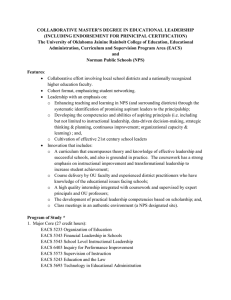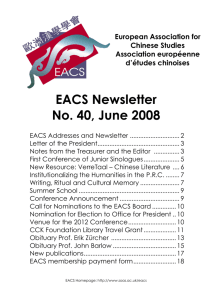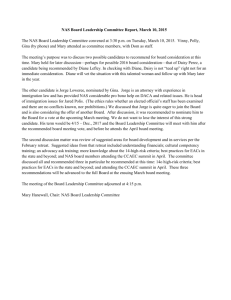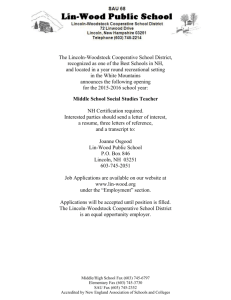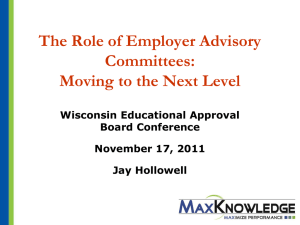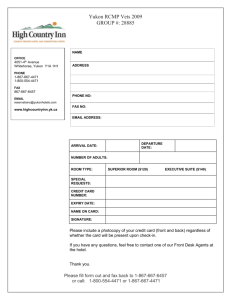A NOTE FROM THE EDITOR
advertisement
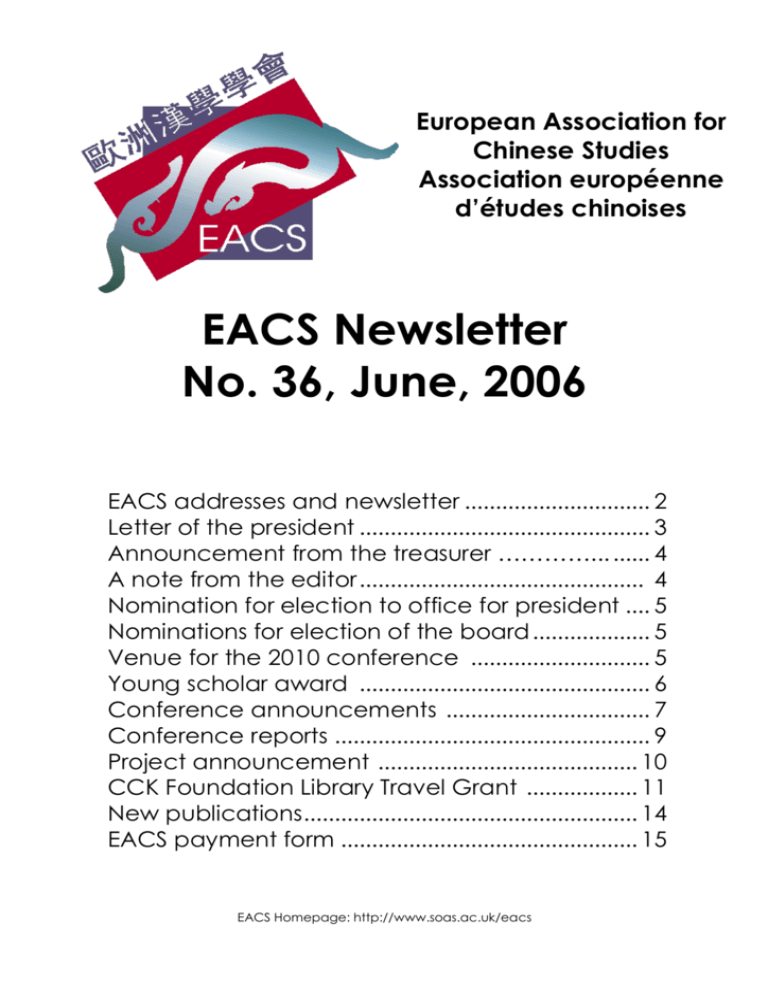
European Association for Chinese Studies Association européenne d’études chinoises EACS Newsletter No. 36, June, 2006 EACS addresses and newsletter .............................. 2 Letter of the president ............................................... 3 Announcement from the treasurer …………... ...... 4 A note from the editor .............................................. 4 Nomination for election to office for president .... 5 Nominations for election of the board ................... 5 Venue for the 2010 conference ............................. 5 Young scholar award ............................................... 6 Conference announcements ................................. 7 Conference reports ................................................... 9 Project announcement .......................................... 10 CCK Foundation Library Travel Grant .................. 11 New publications ...................................................... 14 EACS payment form ................................................ 15 EACS Homepage: http://www.soas.ac.uk/eacs EACS ADDRESSES EACS NEWSLETTER Change of address information and all membership payments should be sent to the Treasurer. The EACS Newsletter is published twice a year: in spring, and in autumn. All contributions should be sent to the Editor by E-mail or on a diskette. Please remember to check your copy carefully before sending it. Workshop and conference reports should not exceed 600 words. Calls for papers should not exceed 100 words. Remember to include all relevant information when contributing new book titles (author, title, publication place, publisher, year, pp., price in EURO and ISBN). Names and titles in non-Latin script such as Cyrillic are welcome provided that the author’s name is in transcription and a short content summary in English is included. Every effort is made to include all relevant news, but the Editor reserves the right to edit all contributions for publication. President Brunhild Staiger, Institute of Asian Affairs, Rothenbaumchaussee 32, 20148 Hamburg, Germany Tel. +49 40 4288740 Fax +49 40 410 7945 E-mail: staiger@giga-hamburg.de Secretary Olga Lomová, Institute of East Asian Studies, Charles University, Celetná 20, 116 42 PRAHA 1, Czech Republic Tel. +420 24 49 14 21 Fax +420 24 49 14 23 E-mail: lom@ruk.cuni.cz Treasurer Matthias Richter, Universität Hamburg, Asien-Afrika-Institut (ChinA), Edmund-Siemers-Allee 1 Ost, D20146 Hamburg, Germany Tel. +49 40 42838 2359 Fax +49 40 42838 3106 E-mail: matthias.richter@unihamburg.de Webmaster Luca Pisano, Dipartimento di Orientalistica – Sezione Sinologica, Via Giulia di Barolo 3/a, 10124 Torino, Italy Tel. + 39 011 6703852 Fax +39 011 6703858 E-mail: lupisano@inrete.it Newsletter Editor Ann Heirman, Department of Chinese Language and Culture, Ghent University, Blandijnberg 2, B9000 Gent, Belgium. Tel. +32 9 264 41 56; fax +32 9 264 41 94 E-mail: Ann.Heirman@UGent.be NEXT COPY DEADLINE: November 1, 2006 Next issue: December, 2006 library visits. This year thanks to the generosity of the Foundation we shall again be in a position to give grants to a limited number of applicants. So far 5 applications have been selected. LETTER OF THE PRESIDENT Dear Colleagues and Friends, Our next conference to be held in Ljubljana is approaching, and preparations are in full swing. They started last September with our board meeting in Ljubljana and since then have been in safe hands with Mitja Saje and his Conference Team. The refereeing process of the submitted paper proposals has been concluded in April and the submitters have been informed by the organizers whether their papers have been accepted. Altogether there will be presented some 180 papers. I am sure the conference will be as interesting and instructive and of the same quality as the last ones. We are in contact with a British publisher contemplating the possibilities of publishing a conference volume with selected papers. Last year we established the EACS database which after several complications seems to work now. I thank all those members who already have entered their data into the database and appeal to those who have not yet done so to register as well and to keep their data up to date. We are very glad that the database greatly facilitated changes or corrections to the membership data, checking of membership fees and applications for membership. The growing number of new young members using online application is a good indication of the usefulness of this convenient tool encouraging us to make wider use of it. I take the opportunity of this letter to inform you that I would be prepared to continue the office of president for another two years in case I shall be reelected. At the same time, however, I should like to encourage you to think of other candidates and to send your nominations to the secretary general. At this year’s conference for the second time we shall be able to honour a young scholar with the EACS Young Scholar Award. The deadline for the submission of papers was 30 April; however it was extended for one month, because there were several enquiries about possible late submission. Since the competition takes place only once in two years, we decided to postpone the deadline in order to receive as many qualified papers as possible. I also take this opportunity to thank the Conference Team and the referees who evaluated the paper proposals for their efforts to make the conference a success. I hope to see many of you in Ljubljana! During the last two years, our Library Travel Programme supported by the Chiang Ching-kuo Foundation has successfully been carried out. Last year 11 young scholars were granted travel expenses and per diem allowances for May 10, 2006 3 Brunhild Staiger ANNOUNCEMENT FROM THE TREASURER The completion of the entries in the database will also be vital in the future for distributing the newsletter. The upcoming conference has brought about an increase in membership as a result both of a fair number of new applications and of some renewals of membership. As already announced in the last newsletter and on the website, all membership affairs will from now on be managed by means of a database. I would like to thank all members who have already completed their data for their cooperation. At the same time, on behalf of the board I would like to ask all others to kindly contact me (e-mail: matthias.richter@uni-hamburg.de) to get the necessary login information and then complete their entry in the database. If you remember when you joined EACS, please include this information so that I can enter it in the part of the database only accessible to the administrators. Applicants for membership please note that the requirement to name a sponsor does not imply any financial support by the sponsor, but merely that you name an EACS member who could, if necessary, confirm your scholarly interest in China. This regulation has been reintroduced on account of some applications by persons who apparently desire membership in the EACS for reasons unrelated to the aims of the Association. The assets of the Association are in good shape. I will report on the situation to the general assembly at the conference and in the autumn newsletter. Invoices to members who have not yet paid this year’s dues will be sent along with this newsletter. Matthias Richter A NOTE FROM THE EDITOR I hear that in some cases there have been technical problems with database access. I will be happy to help as much as I can to solve these problems. Should some members not be able to surmount the technical obstacles, I will also provide a conventional survey form and then enter the data myself. It is the aim of the newsletter to provide information of all kinds on the sinological world, including on activities, publications, scholarships, and other issues of interest to the field. I would like to thank those of you who have sent me their contributions for this issue of the newsletter. I am convinced, however, that much more is going on in the sinological world that did not reach my mailbox! Just let me know so that the news can be spread. I also would like to thank Tim Wright (University of Sheffield) for his friendly and efficient assistance in the English redaction of the newsletter contributions. After discussing this matter in the previous board and also in the current one, we are firmly convinced that the database will make communication between all members easier and will thus be of benefit to everybody. That is why we ask you to go through this procedure, despite the inconvenience especially for those who have already registered in the past using other forms. 4 Please remember that all relevant information of interest to a wider academic audience is very welcome. I hope that with your help the newsletter can remain an important medium for EACS members. representation from different European countries should be guaranteed by including no more than three residents of any single country in the Board (in this case the President counts as one of the three). It is also stipulated that one Board member cannot serve more than three terms (which means 6 consecutive years). In accordance with this regulation, this year at least six Board members will step down. Given the approaching biennial conference and General Assembly, I want to encourage all the EACS members to nominate their candidates for the new Board. I especially appeal to those outgoing Board members who are the only representatives of their country on the Board, to try to nominate a new Board member from among their colleagues. At the same time, in the case of countries with large numbers of EACS members, it is advisable to discuss your representatives in the Board in advance in order to avoid too many candidates from one country, while only three may be included in the Board. Candidates for membership of the Board, please apply formally to the Secretary before the date of the General Assembly. (Do so either in advance using my e-mail: olga.lomova@ff.cuni.cz, or inform me in person on the first day of the conference in Ljubljana.) Ann Heirman NOMINATION FOR ELECTION TO OFFICE FOR PRESIDENT All members of EACS are invited to nominate candidates for the position of the President of the Association. According to the article 10 of our constitution, the President is elected for a period of 2 years (and may be reelected for two further consecutive terms of office). Article 9 of the constitution provides for direct election of the President by the General Assembly and requires nominations for this election, signed by two Ordinary Members, to be in the hands of the Secretary at least two months before the date of the General Assembly. The Board proposes Brunhild Staiger, Senior Research Fellow at the Institute of Asian Affairs, Hamburg. Brunhild Staiger has agreed to continue for another two years. NOMINATIONS FOR ELECTION OF THE BOARD Olga Lomova Secretary General According to article 9 of our Constitution, the Board is made up of twenty-four members, including the President, and is elected by the General Assembly every two years at the time of the biennial conference. According to the same article, a balanced VENUE FOR THE 2010 CONFERENCE During the General Assembly in Ljubljana we will also be discussing where to hold the EACS Conference in 5 2010 (after Lund 2008). This will be then decided at the General Assembly by vote. If you would like to suggest that the conference be held in your country or institution, we kindly ask you to prepare a proposal that can be presented to the General Assembly. Please make sure that the proposal includes basic information about the institution as well as about the plans for organizing the conference, including details about the accommodation and other facilities. second YSA to be awarded in Ljubljana. The original deadline of April 30 2006 has been extended to May 31. I hope we can still manage to inform the nominees about the decision of the jury to invite them to Ljubljana before June 30. The papers submitted for the 2006 YSA will be judged in the same way as in 2004. The Board meeting held in Ljubljana in September 2005 voted for a jury consisting of four EACS Board members plus a member of the organizing committee of the biennial conference. These are as follows (in alphabetical order): Joel Bellasen, Brunhild Staiger, Stefania Stafutti, Jana Rosker and Tim Wright. According to the topics of the submitted papers external reviewers will be invited to judge the quality of individual papers. On the basis of the preliminary evaluation the jury will select three nominees to be invited to come to Ljubljana and present the results of their research in a special session. EACS will cover the travel expenses of the nominees. The final decision on the award will be made by the jury at the conference in Ljubljana and the results will be announced during the General Assembly. Olga Lomova YOUNG SCHOLAR AWARD In 2004 EACS established the Young Scholar Award with the aim of encouraging young scholars under of the age of 35 years. The award receives financial support from the Taipei based Chiang Ching-Kuo Foundation for International Scholarly Exchange, thus building on the continuing and fruitful cooperation between the foundation and EACS. In 2004, out of 11 papers submitted for the first YSA, three nominees were selected and invited to present the results of their research at the biennial conference in Heidelberg. Given the equally high quality of their papers, two winners were selected to share the YSA: Chao-Jan Chen (Université Paris VII) with a paper entitled “Character-Sense Association: A Study on Automatic Sense Determination for Chinese V-V Compounds”, and Xavier Paules (Lyon), with a paper entitled “A Study of Canton Opium Smokers in the 1930’s”. We announced in 2005 the Olga Lomova 6 organized in August 2006. This TSTT conference is aimed at further promoting the application of terminology to various business activities and at strengthening world wide cooperation relating to terminology. For more information, please consult: www.tstt2006.org CONFERENCE ANNOUNCEMENTS THIRD INTERNATIONAL CONFERENCE ON TERMINOLOGY,STANDARDIZATION AND TECHNOLOGY TRANSFER (TSTT 2006) 25-26 August 2006, Beijing,People’s Republic of China *** The theme for TSTT’2006 is “Terminology in the information society, for the emerging knowledge society”. The TSTT Conference is China’s most important event in the field of terminology standardization. The goal is to promote the development of terminology and its application in business, scientific research and education, and to intensify cooperation among related organizations intra- and inter-regionally. The first TSTT conference was held in 1991, which marked the beginning of full scale cooperation between China and the outside world in the field of terminology standardization. In 1997 the second TSTT conference demonstrated the flourishing development of terminology in China with the rapid growth of the IT industry. Now China is becoming more and more involved in the world global economy, and work on terminology has reached a higher stage. Chinese experts are beginning to undertake real tasks in order to develop ISO standards in terminology. To meet the challenge of the new developments in technology and the wide demand for knowledge management, the third TSTT conference, i.e. TSTT’2006, will be 16th INTERNATIONAL CONFERENCE ON CHINA, CHINESE CIVILIZATION AND THE WORLD: HISTORY, MODERNITY AND FUTURE PROSPECTS The RAS Academic Council on Comprehensive Studies of Modern China, together with the RAS Institute of Far Eastern Studies and the Russian Association of Sinologists will hold the 16th International Conference on China, Chinese Civilization and the World: History, Modernity and Future Prospects. The conference takes place in Moscow on October 25-27, 2006. The conference focuses on interrelations between Russia and China: Mutual Perceptions (Past, Present and the Future). The conference coincides with the 50th jubilee of the RAS Institute of Far Eastern Studies, and will summarize the results of the fifty-year research activities of the Institute. Apart from the two Plenary Sessions, the following panels will be organized: 1. Economic Aspects of RussiaChina Cooperation; 2. Russia-China Mutual Perception in the Context of Globalization and International Relations; 7 3. Historical and Political Aspects of Russia-China Interaction; 4. Cross-Civilization Dialogue of Russia and China: A Road to Mutual Understanding; Conference Venue: RAS Institute of Far Eastern Studies No. 32, Nakhimovskiy Ave., Moscow 117997, Russia. Mikhail L. Titarenko Director, RAS Institute of Far Eastern Studies Chairman, RAS Academic Council on Comprehensive Studies of Modern China During the conference, a round-table discussion on Russia and China, entitled Mutual Perceptions, is planned. It will focus on the contexts and prerequisites for positive imagemaking between Russia and China, as well as on the reasons for negative phenomena appearing in the two nations’ public perception of each other. The invitation to take part in the conference is extended to Sinologists in Russia, CIS countries, PR China, India, Korea, Japan, United States, Europe and other countries. Conference paper abstracts in Russian, English or Chinese should be forwarded by an e-mail, entitled October Conference Abstracts to: karganova@ifes-ras.ru . The abstract should be under 8000 characters, spaces included. It should be sent in RTF format, and should contain the author’s name, affiliation and degree in the upper right corner of the front page. Please use endnotes rather than footnotes. For publication in the conference proceedings volume, the abstracts should be sent to the Organizers by May 10, 2006 at the latest. Abstracts sent after that date may be distributed among conference participants in other than published forms. The Organizing Committee includes: Dr. Roustam Aslanov, IFES DeputyDirector (Chairman); Tamara Karganova, Head of International Ties Dpt. (e-mail: karganova@ifes-ras.ru). *** ASIAN STUDIES AT A TURNING POINT – TANDEM WALK OR BOXING MATCH BETWEEN SOCIAL SCIENCES AND HUMANITIES? On November 6 and 7 2006, the Centre for East Asian Studies, University of Turku and the Nordic Institute of Asian Studies, Copenhagen are organizing a conference for academic dialogue on current methodological and paradigmatic topics in Asian studies across disciplinary and regional boundaries. The conference will be held at the University of Turku. The keynote speakers include: Richard Baum (UCLA), Prasenjit Duara (University of Chicago), Joseph Cheng (City University of Hong Kong) and Barbara Andaya (University of Hawaii). For further information, please consult the following website: asianstudies.niasconferences.dk Lauri Paltemaa (laupalt@utu.fi) Senior Research Fellow, Centre for East Asian Studies University of Turku 8 and Hangzhou; but it has also developed certain characteristics that are quite unique to it. The city’s very rich cultural history offers opportunities for scientific research from numerous angles, and indeed, during recent years, Yangzhou has attracted an increasing amount of scholarly interest. Two European scholars who were aware of this fact, Vibeke Børdahl (Nordic Institute of Asian Studies, Copenhagen) und Lucie Olivova (Palacký University, Olomouc), established the “Yangzhou Club” to serve as a cross-disciplinary platform for scholarly exchange and cooperation. As the first major activity of this informal group, they organized the “Workshop on Lifestyle and Entertainment in Yangzhou” which was held in Yangzhou itself, from the 20th to the 22nd October 2005. It was the two organizers’ basic idea to convene a workshop right in situ, in order to combine the discussion of results from individual research with the experience of the specific local atmosphere, the study of material culture and intellectual exchange with local scholars and artists. The workshop was funded by the Norwegian Research Council (Oslo) and the Nordic Institute of Asian Studies. Two local colleagues, Huang Ying (Yangzhou University) and Fei Li (Yangzhou Performed Literature Society), provided indispensable support to the preparation work. CONFERENCE REPORTS WORKSHOP ON LIFESTYLE AND ENTERTAINMENT In YANGZHOU October 20–22, 2005, Yangzhou, China The city of Yangzhou (Jiangsu province) on the northern shore of the Yangzi river, is certainly not among the locations of China that strike tourists as an absolute “must” on their itineraries. Its relatively peripheral position in the present national context is indicated, for example, by its inadequate connection to the modern transport networks, although a recently established railway connection and a bridge crossing the Yangzi at Zhenjiang are signs of a new turn of development. However, from the Tang (8th/9th centuries) through the mid-Qing (18th century), Yangzhou was considered a central place in the empire, for it was located at the junction of the two main axis of transportation, the Grand Canal and the Yangzi river. Commerce, and most of all, the salt monopoly trade, was of the utmost importance to the city’s economic development. Yangzhou’s history has also been marked by sharp ruptures as it was repeatedly hit by large-scale destruction and human loss through warfare. But it was only during the 19th century that the old cultural town of Yangzhou submerged into relative insignificance. *** What then made, and perhaps still makes, Yangzhou so special? It is true that the city has a number of parallels and commonalities with other major cities of great cultural-historical significance, such as Suzhou, Nanjing, 9 WRITING AND RITUAL IN THE ANCIENT CIVILIZATIONS OF ASIA AND AMERICA influence of writing and ritual practice in the process of cultural transmission. Cultural anthropologists argued that orality plays an important role in traditional life and ritual performance. Evidence from their own fieldwork in Han villages of Southern China and in Kazak settlements in Xinjiang were presented to prove their arguments. Other topics concerned the history of research into possible Transpacific diffusion and methods of cultural comparison. The languages of the conference were English, Chinese and German. A second conference focusing on social memory and cultural identity in China and Mesoamerica will be held during the second half of 2007 in Germany. From 5 to 7 October 2005, the Institute of Sinology of the University of Munich and the Institute of Ethnology and Ancient American Studies of the University of Bonn in cooperation with the Institute of Socio- and Cultural Anthropology of Xinjiang Normal University organized an international symposium on writing and ritual practices in the ancient civilizations of Asia and America at Tongji University in Shanghai. It was financed by the Volkswagen Foundation through its Tandem project Writing, Ritual and Cultural Memory in Ancient China and Mesoamerica (2005-2008), which is directed by Xiaobing Wang-Riese and Daniel Graña-Behrens. About thirty experts from China, Germany, Japan, Mexico and the U.S.A. representing different disciplines discussed how and why writing and ritual constitute important mechanisms for the transmission of cultural knowledge and how this occurred in ancient cultures of Asia and America. Linguists and experts on writing systems, art and literary historians, Sinologists, Mesoamericanists and ethnologists presented papers on various early and recent writing systems, e.g. Chinese oracle-bone inscriptions, “Women’s Writing”, the Naxi and Yao scripts as well as Maya hieroglyphic writing and Central Mexican iconography and writing. Important aspects included the cultural functions of writing, the relationship between icon and writing and between writing and language, the form and use of books, and the mutual For further information, see the following website: www.fak12.unimuenchen.de/sin/projekte/meso/mesoindex.html Xiaobing Wang-Riese Universität München PROJECT ANNOUNCEMENT Monies, Markets, and Finance in China and East Asia, 1600-1900: Local, Regional, National, and International Dimensions The research carried out within the above project concentrates on the copper-based monies of Qing China, Tokugawa Japan, and late Choseon Korea. The focus is on the concrete conditions of coin production, starting from the mining and smelting of mint metals, their transport to the mints, to the casting of coins on the one hand, 10 and on problems related to the functions and exchange rates of different means of payment, the structures of the financial systems as well as the cultural meanings of money on the other. On the basis of selected case studies these topics will be highlighted in their local, regional, national and international dimensions and interdependencies. The research group is composed of scholars in Chinese studies, Japanese studies, and geography from the universities of Tübingen, Heidelberg and Bochum, in close association with colleagues in economic history and comparative literature. The members of the research group, together with the numerous national and international collaborators, will utilise methods from a variety of disciplines, such as social and economic history, history of technology, history of literature and art, numismatics, geography, and econometrics. In the course of the research work, massive bodies of mostly unpublished archival documents will provide a substantial and largely new empirical foundation. These consist primarily of Qing government reports concerning minting and mint metal transport, and documents from Japanese mines and Korean local archives. A variety of other types of sources will also be consulted and analysed, such as coins, illustrations and maps, fiction, drama, poems and jottings, travel reports, newspaper articles, and religious texts. The research group aims at contributing a new, empirically founded perspective on East Asian monetary history, supplementing the existing research on silver. Besides the quantitative and qualitative dimensions of the production and transport of mint metals and coin output, the project will attempt to evaluate the organizational capacity and flexibility of early modern Asian states, illuminate the structures of cooperation and cooptation between the state and the private economy, and analyse perceptions of money, wealth, and poverty in East Asian and Western civilisations. This project has benefitted from the generous support of the Ministry of Science, Research and Art of the State of Baden-Württemberg through its programme for the promotion of research. The research project will last for six years. More information can be found at the following website: http://www.monieseastasia.unituebingen.de. Hans Ulrich Vogel Universität Tübingen CHIANG CHING-KUO FOUNDATION LIBRARY TRAVEL GRANT In 2006 the Chiang Ching-kuo Foundation continues its generous support to the EACS to support oneweek visits for specialised research in Sinological libraries in Cambridge, Heidelberg, Leiden, London, Oxford, Paris or Munich. The next deadline is 20 October 2006. A response will be sent within three weeks of the deadline. Applicants should be Sinologists based permanently in Europe and 11 preferably paid-up members of the EACS. Applications from nonmembers will be considered, however, especially in case of students and young scholars (up to 35 years), if accompanied by a recommendation letter from an EACS member. 6) in the case of Ph.D. students, a letter of recommendation from their supervisor; 7) in the case of non-members, a letter of recommendation from an EACS member; 8) address for correspondence, including fax and e-mail where possible. PRIORITIES for the applicants are as follows: a. Students from Central and Eastern Europe b. Students from Western Europe c. Scholars from Central and Eastern Europe d. Scholars from Western Europe APPLICATIONS should be sent by mail or fax to the secretary general (Prof. Olga Lomová, Institute of East Asian Studies, Charles University, Celetna 20, Prague 1, Czech Republic; fax: +420 224491423; e-mail: lom@ruk.cuni.cz) and to one of the following: 1) for research on pre-modern China (i.e. before 1840) to Dr. Bernhard Fuehrer, School of Oriental and African Studies, London, Thornhaugh Street, Russell Square, London WC1H OXG, United Kingdom. Fax: +44 (0) 20 7898 4239. E-mail: bf3@soas.ac.uk APPLICATIONS must include: 1) a letter stating the library to be visited and intended dates of travel; 2) a statement of purpose, with a short description of the research project, including precise indication of the sources and material to be used (the easiest way to obtain this information is to go to electronic catalogues of the respective libraries accessible also through the EACS website at www.soas.ac.uk/eacs); 3) a written statement obtained from the Librarian of the institution where the proposed visit is to take place confirming that the research materials that are required are available for consultation; 4) a one-page curriculum vitae with a list of main publications (in case of more advanced scholars); 5) a statement of travel and living expenses (Apex economy airfare or 2nd class rail fare, and reasonably priced accommodation), including a note of other sources of funding. 2) for research on modern China (i.e. from 1840) to Prof. Guido Samarani, Universita Ca' Foscari di Venezia, Department of East Asian Studies, Palazzo Vendramin, Dorsoduro 3462, 30123 Venezia, Italy. Tel. +39 041 2349511, Fax: +39 041 2349596. E-mail: samarani@helios.unive.it 3) for research, which straddles the 1840 limit: either to Prof. Fuehrer or to Prof. Samarani. It is advisable to apply at least three months before the visit is planned to take place. 12 PAYMENT OF GRANTS delphine.spicq@college-de-france.fr 1) If applications are approved, grants will be made to include travel expenses and a per diem allowance, which will vary from place to place. 2) The grants will be paid on completion of the visit only. 3) In special cases when the applicant has valid reasons for needing to receive the grant in advance, please indicate those reasons in the application. 4) On completion of their visit, all scholars should obtain a letter signed by the Librarian, certifying that the visit has been made and specifying the dates when it began and ended. 5) All scholars should send the Librarian’s letter directly to the EACS President, Prof. Brunhild STAIGER who is in charge of the financial administration of the grant: Institut für Asienkunde Rothenbaum-chaussee 32, D-20148 Hamburg, Germany. E-mail: staiger@giga-hamburg.de 6) Upon completion of the visit, a brief report should be sent to Prof. Olga Lomová (see her address above). Any publication using material collected under this program should include acknowledgement of help received from the CCK Foundation. GERMANY: Ms A. Labitzky-Wagner, Institut für Sinologie, Universität Heidelberg, Akademiestrasse 4-8, D69117 Heidelberg, Germany. Fax: +49-6221-54 24 39. E-mail: alw@sino.uni-heidelberg.de LIBRARIANS (For further details about the libraries see our web-site or the web-site of the European Association of Sinological Librarians at: http://www.easl.org) Frances Wood, British Library, Chinese Section, Oriental & India Office Collections, 96 Euston Road, London NW1 2DB, UK. Fax: +44-171-412 78 58. E-mail: oiocchinese@bl.uk Ms. Renate Stephan, Bavarian State Library, Section East Asia, Fax + 49-89-28636-2805. E-mail: stephan-bahle@bsb-muenchen.de NETHERLANDS: Hanno Lecher M.A., Sinologisch Instituut, Arsenaalstraat 1, 2311CT, Leiden, The Netherlands. Fax: +31-71-27 226 15. E-mail: bibchin@let.leidenuniv.nl UNITED KINGDOM: Charles Aylmer, Chinese Section, University Library, West Road, Cambridge CB3 9DR, United Kingdom. Fax: +44-1223-333 160. E-mail: caa@ula.cam.ac.uk Sue Small, School of Oriental & African Studies, University of London, Thornhaugh Street, Russell Square, London WC1H OXG, UK. Fax: +44171-436 38 44. E-mail: ss8@soas.ac.uk FRANCE: Delphine Spicq, Bibliothèque de l’Institut des Hautes Etudes Chinoises, Collège de France, 52 rue du Cardinal Lemoine, 75231 Paris Cedex 05, France. Fax: +33-1-44 27 18 79. E-mail: David Helliwell, Bodleian Library, Oxford, OX1 3BG, United Kingdom. Fax: +44-1865 277132. E-mail: djh@bodley.ox.ac.uk 13 NEW PUBLICATIONS Zhongguo keji dianji yanjiu. Di san jie Zhongguo keji dianji guoji huiyi lunwenji 中国科技典籍研究。第三届 中国科技典籍国际会议论文集. Studies on Ancient Chinese Scientific and Technical Texts. Proceedings of the 3rd ISACBRST. Zhengzhou: Daxiang chubanshe 2006. ISBN: 75347-3860-1/G 3152. 40 Yuan RMB Luo Guifen, The Forgotten Dimension: A Case Study of Chinese Female Rural-Urban Migrants and the Social Security System in the Context of Modernization. Turku: Annales Universitatis Turkuensis Humaniora 284, 2005. 210 pp. ISBN 951-29-29538. € 18 Christine Moll-Murata, Song Jianze and Hans Ulrich Vogel (eds.), Chinese Handicraft Regulations of the Qing Dynasty: Theory and Application. München: Iudicium, 2005. ISBN 389129-405-0. 559 pp. € 84 Sheng Yalü 胜 雅 律 (Harro von Senger), Sanshiliu Ji de Guanli Zhihui [Management-Wisdom Based on the Thirty-Six Stratagems]. Taibei: Zhishiliu Chubanshe (Knowledgism Publishing Co., Ltd.), 2005. 269 pp. ISBN 986-81328-3-5. 290 NT$ Lauri Paltemaa, In the Vanguard of History - the Beijing Democracy Wall Movement 1978-1981 and Social Mobilisation of Former Red Guard Dissent. Turku: Annales Universitatis Turkuensis Humaniora 288, 2005. 390 pp. ISBN 951-29-2976-7. € 24 Matthias Richter (ed.), Methodological Issues in the Study of Early Chinese Manuscripts: Papers from the Second Hamburg Tomb Text Workshop. Asiatische Studien / Études Asiatiques LIX (2005.1). 390 pp. Matthias Richter, Guan ren: Texte der altchinesischen Literatur zur Charakterkunde und Beamtenrekrutierung [Early Chinese Texts on Characterology and the Recruitment of Officials]. (Welten Ostasiens 3). Bern: Peter Lang. 504 pp. ISBN 3-03910643-1. € 74 Hans Ulrich Vogel, Gao Xuan and Christine Moll-Murata (eds.), 14 EACS MEMBERSHIP PAYMENT EACS membership fee is at present €20 per annum for individual and corporate members (for members from Eastern European non-EU countries the cost is € 10.00), and €10 per annum for student members (remember to send in a student-ID). Fee payment for up to four years is recommended to save transfer costs. The EACS Newsletter is sent free of charge to all members. Please send payment to the EACS Treasurer Matthias Richter, Universität Hamburg, AsienAfrika-Institut (ChinA), Edmund-Siemers-Allee 1 Ost, D-20146 Hamburg, Germany. Members living in the EURO zone are kindly asked to pay by bank transfer to the EACS account: Dresdner Bank, bank code 200 800 00, account 04009 952 01. Please use standard international transfer with IBAN: DE 29 20080000 0400995201; SWIFT-BIC: DRES DE FF 200. Remember to add the name of the Treasurer when making this type of transfer. If you prefer to pay your fees by credit card (American Express, MasterCard/Eurocard, VISA), which is recommended for members from non-EU countries, please fill in the Credit Card payment form below. Please make sure to write the name of the card holder exactly as it appears on the credit card and do not forget the expiry date of the card. ________________________________________________________________ CREDIT CARD PAYMENT FORM (please write clearly in printed letters) Name of card holder (exactly as it appears Corporate name: on the credit card) Type of credit card (tick): Credit Card number: American Express: MasterCard/Eurocard: VISA: Name of member(s) for whom you are Expiry date: paying: Number of years for which you are Total amount in Euro: paying: Date: Signature: The Credit card payment form is to be sent or faxed to the EACS Treasurer Matthias Richter, Universität Hamburg, Asien-Afrika-Institut (ChinA), Edmund-Siemers-Allee 1 Ost, D-20146 Hamburg, GERMANY. Fax +49 40 42838 3106. - 15 - EACS OFFICERS President Vice-President Secretary Treasurer Newsletter Editor Webmaster Brunhild Staiger* Matthias Richter* Stefania Stafutti Ann Heirman Olga Lomova* Luca Pisano *Member EACS Executive Committee EACS BOARD MEMBERS Joel BELLASEN. INALCO, Paris, France. Jana BENICKA. Comenius University, Bratislava, Slovakia. Daria BERG. University of Nottingham, Nottingham, UK. Carine DEFOORT. Catholic University of Leuven, Leuven, Belgium. Halvor EIFRING, Oslo University, Oslo, Norway. Stéphane FEUILLAS, Université Paris 7, Paris, France. Denise GIMPEL, University of Copenhagen, Copenhagen, Denmark. Imre HAMAR. Eotvos Lorand University, Budapest, Hungary. Ann HEIRMAN. Ghent University, Ghent, Belgium. Anna KHAMATOVA. Far Eastern State University, Vladivostok, Russia. Olga LOMOVA. Charles University, Prague, Czech Republic. Cecilia MILWERTZ. NIAS, Denmark. Andrey V. OSTROVSKIY. Russian Academy of Sciences, Moscow, Russia. Lauri PALTEMAA.University of Turku, Finland. Irina POPOVA. Russian Academy of Sciences, St. Petersburg, Russia. Matthias RICHTER. University of Hamburg, Hamburg, Germany. Jana ROŠKER. University of Ljubljana, Ljubljana, Slovenia. Guido SAMARANI. Università Ca' Foscari, Venezia, Italy. Stefania STAFUTTI. Università di Torino, Torino, Italy. Brunhild STAIGER. Institute of Asian Affairs, Hamburg, Germany. Lam SUN. University of Minho, Braga, Portugal. Marina SVENSSON. Lund University, Lund, Sweden. Maghiel VAN CREVEL. University of Leiden, Leiden, The Netherlands. Tim WRIGHT. University of Sheffield, Sheffield, UK. - 16 -
